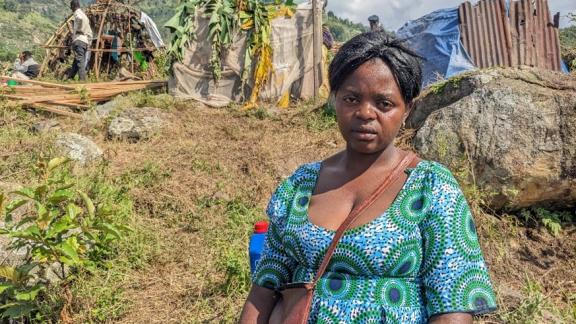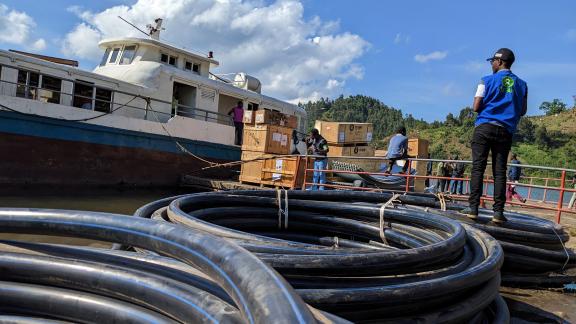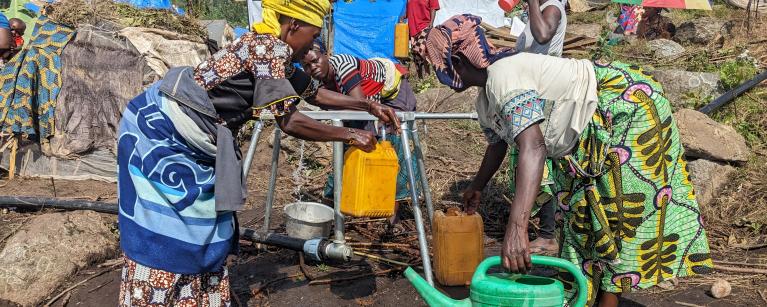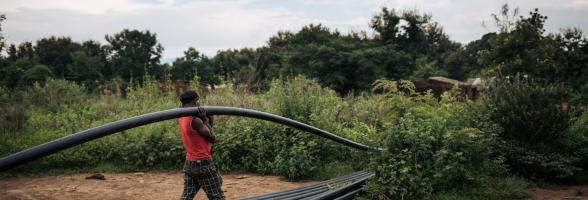The Kalehe territory in the province of South Kivu (eastern Democratic Republic of Congo) is facing a humanitarian crisis after torrential rains caused flooding and landslides on May 4, 2023. The flooding destroyed basic infrastructures in two health districts, Bushushu and Nyamukubi, where the water swept away houses and valuables, destroyed fields and caused a number of deaths.
More than 443 people are reported dead and more than 5,000 missing. The survivors, estimated at more than 18,000 people (or 3,000 households), are living in schools, churches and makeshift campsites, with no water, hygiene or sanitation services.
"Before the disaster, I lived in the village of Nyamukubi," says Lawrence Kakira. "When the floods hit, I was on my way back from the market. Unfortunately, I lost everything and that's how I ended up on this site. Since we arrived here, our biggest problem has been finding drinking water."
“ We have a really hard time finding water, even though water plays a very important role in our homes, either to drink or to cook. It was already very difficult for us, and now we're afraid of catching a water-borne disease. We were spared by the disaster, but it might just be the unsafe water that will kill us. "
"Oxfam responded quickly, and when we saw Oxfam staff coming to assess the situation, we felt relieved because we knew that at least a solution would be found."

Lawrence Kakira M, who survived the natural disaster in Kalehe. Photo Credit: Yves Kalwira/ Oxfam
Oxfam and its partner Action des Volontaires Unis pour le Développement et la Santé (AVUDS) are responding to the crisis in Kalehe through a project funded by the DRC Humanitarian Fund to provide urgent water supply to 18,000 (5,400 girls, 4,500 boys, 4,320 women and 3,780 men) people by repairing and rehabilitating damaged water supply networks, wells and springs.
Oxfam and AVUDS are also distributing non-food essentials (buckets, cups, jerry cans and soaps) to 2,788 households, rehabilitating toilets in health centres and schools, building emergency showers and toilets in various sites, promoting public health by raising awareness on hygiene and training community members on water supply and sanitation.
Nsimire came from Bushushu after the recent floods and now lives in the Mushonezo disaster site in central Kalehe. Conditions at this site are difficult for her and hundreds of others, and Nsimire was particularly concerned about the lack of proper sanitary facilities: "Before, we had to go to the toilet in the bush. It was very dangerous and not hygienic at all. We were also afraid of catching diseases, especially infections for us women".
The aim of the project is to also identify 2,500 girls and women who will receive personal hygiene items (multi-purpose sanitary towels, underwear, plastic jugs, multi-purpose soaps and nylon strings). This distribution will be followed by hygiene awareness campaigns.
Lawrence Kakira is delighted that water is now so close to the site where she lives: "Today, it's a real relief to see that clean water is already flowing just a few metres from my little hut. Now we're calling for more help, because we need almost everything."

Despite all the work that has already been done, there are still major needs to be met. Justine Tossou Gomis, Oxfam's Country Director in the DRC, is calling on the international community to act to prevent more suffering: "I have spoken to members of the community, and they hope that lasting solutions will be found. They are still living in precarious conditions, and soon the rainy season will begin, leaving them at the mercy of bad weather. I appeal to the international community to work together to prevent the worst from happening".
Many people in the area are still living in harsh conditions, without proper sanitary facilities. CIZA Bahavu Célestin, president of the Mushonezo site, is still worried about the lack of food for the 317 households living on the site. The assistance provided is still insufficient to help all the people who have lost their livelihoods as a result of the disaster.
On top of the humanitarian crisis caused by natural disasters, Kalehe territory continues to host displaced people fleeing fighting between armed groups in Masisi territory, in the neighbouring province of North Kivu. Since 15 August, around 1,800 newly displaced people have arrived in the Minova health district, bringing the total number of displaced people to more than 120,000 since February 2023. They have settled in schools and are living in precarious conditions. With displaced people living in schools, a shortage of basic necessities, increased pressure on water points and rising food prices due to growing demand on the markets, the living conditions between displaced people and the host communities are deteriorating.
According to local civil society, around 16,500 displaced people are living in precarious conditions in the Mbinga Nord settlement. Since May 2023, these people have fled the repeated atrocities committed by armed groups in the Hauts Plateaux of Ziralo and Nyamukubi, located in the Kalehe health district.

